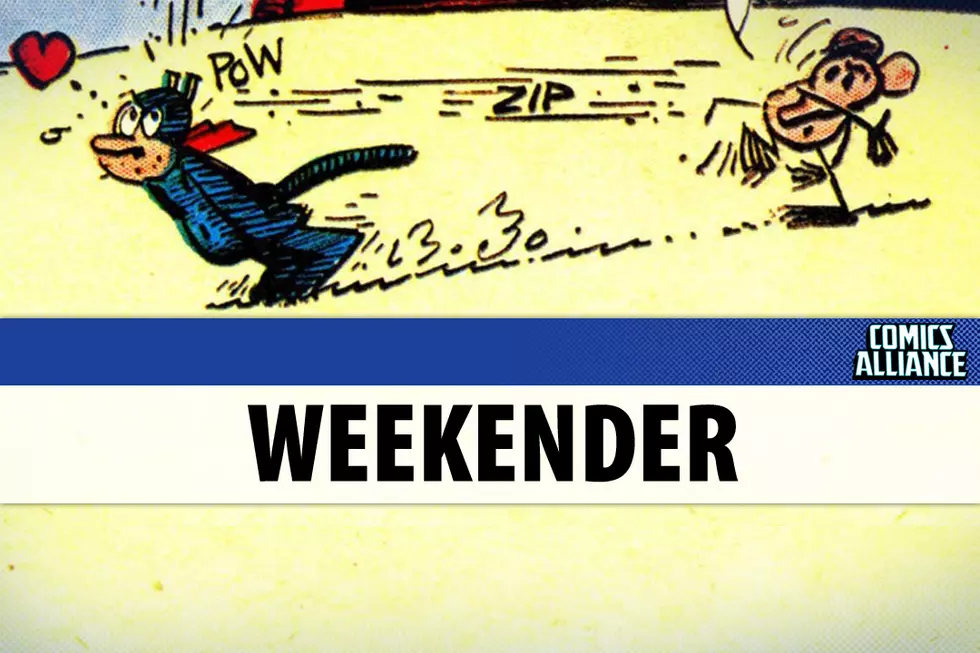
Noah Van Sciver: The Brains And Artistic Brawn Behind ‘Blammo’
 Thanks to Diamond's extremely relaxed shipping schedule this week, comic fans entering their favorite shops are faced with a unique opportunity to try something new, something different, something wonderfully weird. In a word, something indie.
Thanks to Diamond's extremely relaxed shipping schedule this week, comic fans entering their favorite shops are faced with a unique opportunity to try something new, something different, something wonderfully weird. In a word, something indie.
Readers seeking all of the above need look no further than Noah Van Sciver's most recent release, "Blammo" #5.
The latest in a series of anthology-like issues, "Blammo" #5 sees Van Sciver employ a smattering of storytelling methods as he lets loose ghostly typewriters, Greyhound-traveling meth heads, post-apocalyptic skull-stealing chickens and his own burgeoning paranoia upon readers.
To be frank, "Blammo" is the Sea World Orlando of today's underground comics scene and any reader willing to try something new will want a front row seat to Van Sciver's splash zone. The metaphorical waters are lousy with imagination and that's just the way Van Sciver likes it.
ComicsAlliance caught up with the Colorado-based artist for his thoughts on "Blammo," building a career in the indie marketplace, and what's next on his list of things to do in the coming year.
ComicsAlliance: Can you tell us a little about the creation of "Blammo" #5? How did the issue's various components come together in their final printed form?
Noah Van Sciver: I think I changed my mind about number five's content more than any other issue so far. Originally it was going to be entirely about Abraham Lincoln, then I thought I'd print this ghost story I had drawn, then it was going to be the "art issue" or something... I drew a story about this big mansion a block away from my apartment, and then shelved the idea of doing another issue and went on a comic signing tour with a friend of mine. On the tour, all of these different ideas started popping into my head for Blammo #5, and when I came back I just did nothing but draw. I ended up using the Mansion story after all as well.

CA: In reading your letters column, the "Thank You" section at the beginning of the issue and "More Tales of Despair," you seem to have a pretty interesting relationship with your readership and the comics industry as a whole. In your experiences so far, has expanding your readership expanded your ability to create, or is it a case of "Mo Money Mo Problems?
NVS: I don't know. I think I'm kinda building my own secret club sometimes. It's been really surprising for me to find out who reads Blammo. I'll get e-mails and letters from people that I admire so much that I can't even believe they are real people! And I get a dizzy feeling when I find out that they even know who I am! I think of myself as an invisible man. A complete nobody. And when I draw my comics, I'm not drawing for anybody else but myself. I don't even think that anybody is ever going to see what I'm doing when I do it. Luckily that feeling hasn't gone away yet, but I'll be the first to tell you when I think I'm done for.
CA: One of the first artists that came to my mind when I first checked out your work online was Peter Bagge (who I noticed wrote you a nice note in "Blammo" #5). Who do you consider your biggest influences as a comics creator? Are there any creators who you're compared to that you find frustrating or don't relate to?
NVS: Jesus, I get compared to Crumb a bit too much. I can't complain about that, though. Crumb's one of the best! It's probably better than being compared to Rob Liefeld! I get Peter Bagge and Johnny Ryan sometimes too. But, I didn't even read any Peter Bagge comics until embarrassingly not too long ago. I think the biggest influence on my autobio stuff is Joe Matt and I want to be able to write short stories like Tim Lane. Tim Lane is my god.

CA: Like a lot of comic creators and other successful creative people you gave art school a go, but it didn't take. What, if any, advice would you give to an aspiring creator on the fence about their preferred dosage of higher education?
NVS: I don't want to say "Do what I did (drop out)" but for me, I realized really early on in my art schooling that it wasn't going to steer me in a direction I wanted to go in. I like cartoons and Art school seemed to be very anti-funny to me.
CA: As a full-color comic on glossy paper, the production values are relatively high on "Blammo" #5. How important do you think aesthetic qualities are to creator-owned work? Do you think it gives readers additional value or incentive to try out a new comic, or is is just a simple augmentation of the work within?
NVS: I'm not sure if they are really that important. One of my favorite comics is "King-Cat" and that is a clean looking comic, but you can't say that the production is really high. I am just getting a little bit better at figuring out how to put together a nice comic. I do want "Blammo" to look different than other comics on a shelf, and so I try to think about the details. For example the cover should out-weird the comics around it at a comic shop. That's a big goal of mine. I like to picture "Blammo" on somebody's table at home, and for the guests to see it and think "What the hell is that?"

CA: Through your comics you've had the chance to connect with many of the most influential creators in alternative/underground/indie comics working today. You've illustrated or written about many of these experiences, but how would you characterize the impact that these meetings have had on you as a creator and a person overall?
NVS: Like I said, I'm always surprised at who finds my comics. All of it makes the world seem a lot smaller, you know? But, still I live in a city with practically no comic scene in comparison to other cities. So, all of that stuff fades away and becomes unreal to me again in time. And before I know it, I'm sitting in my room completely alone again. Just me and my books.
CA: While it's not really possible to compare your work to your brother's [Ethan Van Sciver] given your different approaches to comics, have you benefited, on a personal level, from a little artistic rapport in the family? How do you think your work would have turned out in an alternate reality where you were an only child?
NVS: Ethan is a good brother. He's given me some good advice in the past about what's a waste of time and what's not. He wants me to be okay and to be able to live, but since we operate on two different sides of the industry, it's not like he can help me get work drawing comics. But, I think he makes up for it with pep talks. I think without him I probably wouldn't have thought of drawing comics. But who knows? Maybe somebody else would've encouraged me.

CA: Paranoia was a pretty notable theme of "Blammo" #5, especially in the stories "One Way To Go" and, of course, "Paranoia." Many of your autobio strips seem to justify any perceived sense of anxiety or paranoia you might have based on past experiences. Is it an issue you literally deal with in your daily life, or is it simply a concept you enjoy exploring through your comics?
NVS: I got really paranoid once I moved into downtown Denver, for some reason. I walk to work really early in the morning when it's pitch black outside and sometimes I'll see somebody else walking towards me and I wonder "Am I going to be killed on my way to a job I don't even want?". It's completely possible this will happen, and if it does, I'm sure it will be gory enough to make national headlines. Horrific murders happen in cow towns. This feeling creeps into my work all the time. I find myself drawing homeless people a lot in my comics, and it comes from my environment.
CA: At the end of your latest "Blammo" release, you discuss your next major project, "The Hypo," as well as the events from your personal life that shaped your output over the past year. Given the subject matter of "The Hypo," an original graphic novel dealing with Abraham Lincoln's depression, how do you think your own experiences over the past several months have contributed to your perspective on the project?
NVS: I've been working and studying Lincoln's early adulthood for this book since March 2009. And then in April my girlfriend almost died and was in the hospital for a while. It was a strange period to say the least. I was reading all about how dark Abraham Lincoln felt about his own life and mortality, and all of a sudden I was getting an up close look at mortality. I'm hoping that I can really put together a story that portrays that feeling, while also not looking like a typical biographical comic book. I want to take my time with it. "The Hypo" is a special project to me.

CA: In creating everything from autobio comics to more ambiguous fictional works you have the ability to communicate many aspects of your personality without ever being laid completely bare. How much of yourself are you comfortable showing your readers? How do you balance honesty with privacy?
NVS: I like to tell honest stories about myself and my fears while hiding behind humor or fiction. I'll show any side of myself that I think a reader would relate to. But, there are a lot of things that I wouldn't put in my comics. Or at least I wouldn't publish.
CA: Is there anything about your upcoming projects, appearances or anything else that you think our readers should know about?
NVS: Well, I think I'm just gonna be working on "The Hypo" for a while and maybe I'll continue trying to convince Atomic Books in Baltimore to publish the complete Blammo book, so that people can have access to all the issues as well as the random strips I've done for mini comics. Maybe a few other secret projects.
More From ComicsAlliance



![Frederik Hautain Leads Creators into The Broken Frontier [Back Pages]](http://townsquare.media/site/622/files/2015/04/cover_robbirodriguez-crop.jpg?w=980&q=75)





